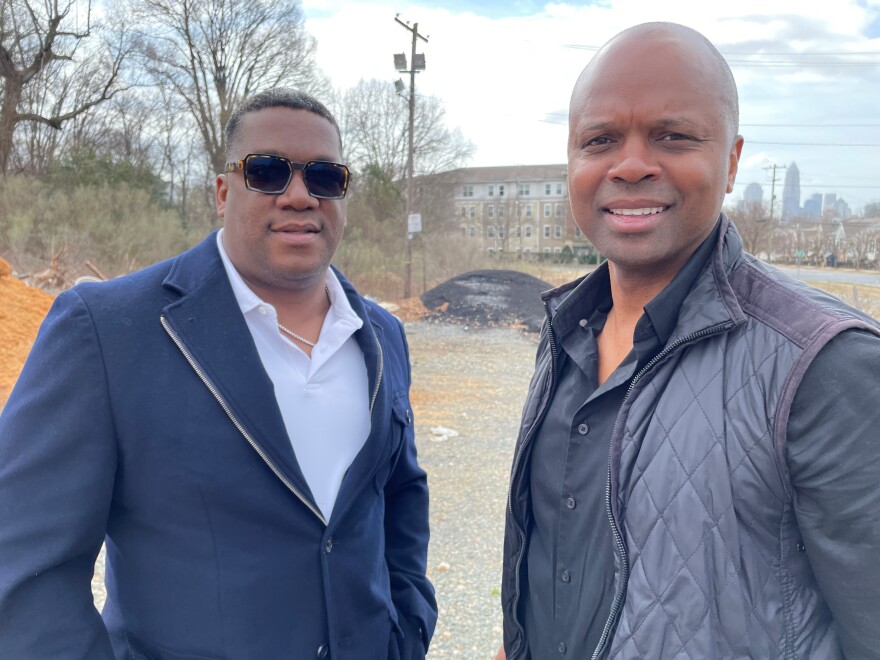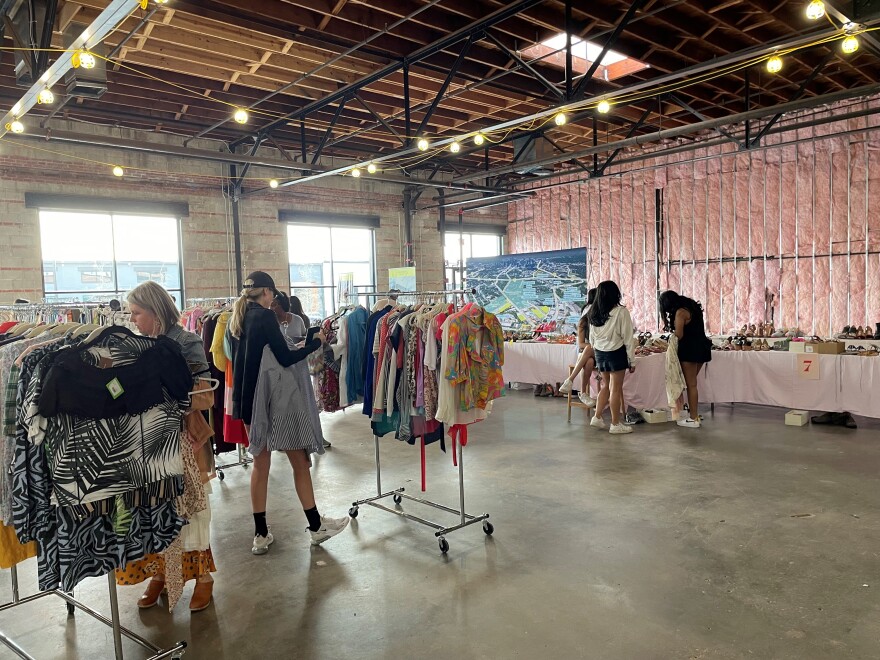Stores, restaurants and local businesses help define neighborhoods, create an identity and allow residents to flourish. In Charlotte’s Corridors of Opportunity, developers are transforming strip malls, warehouses, and vacant spaces and trying to gauge what will draw people and turn a profit. The hope is to cultivate more local economic opportunities while still supporting longtime businesses. It can be a tricky balance, especially in areas where investment is picking up with an influx of new residents.Asian Corner Mall makes way for a new development
Asian Corner Mall sits on 27 acres near a light rail stop at North Tryon and Sugar Creek a few miles north of uptown. It’s at another crossroads — one that will determine what its next life will be.
The site is now coveted land, but it wasn’t when three sisters from Vietnam bought the mall in 1997 and transformed it into a gathering place for the region’s Asian community — anchored by two Asian supermarkets.
But the last decade was tough on the mall — businesses moved out, upkeep declined and potholes in the parking lot deepened. And then last year some of the mall owners were offered $8.5 million to sell their half of it to local developer Beauxwright — and they did.

Ivy Nguyen was helping to pack up the International Supermarket last month, earlier than expected after the fire department closed half the mall for unsafe conditions. She tried talking but stopped.
“Not now. It’s just so emotional,” said Nguyen.
Alex Bui grew up going to the mall. He now heads the Vietnamese Association of Charlotte.
“We're a growing city, and I can understand the development of the light rail here. It's a key ideal for some of the newer generations to live, eat, to play and work,” he said.
That’s the plan for the space and the blocks surrounding it too — apartments, offices, and a mix of stores and restaurants. Bui said that comes with a cost.
“It's heartbreaking to actually lose a piece of the Asian culture here in Charlotte,” said Bui.
But others — not just developers — have a lot of hope for what’s to come.Before Asian Corner Mall there was Tryon Mall

The Hidden Valley neighborhood across Tryon is now made up of mostly Black residents. Those who have been there a long time fondly remember the space under another name — Tryon Mall.
“It had a good variety of retail shops, and I'd like to see that come back with a grocery store,” said John Wall, who has lived in Hidden Valley for nearly 50 years.
He reminisced with another neighbor Buford Harvell about the heyday of Tryon Mall before it too fell on hard times in the '80s and '90s as development shifted farther north to the University area, other malls like Eastland opened, and white residents left surrounding neighborhoods.
“The Mecklenburg Library was there for a minute,” recounted Wall.
“I used to go down to the library. Plus, there [was] the drugstore Eckard’s there, and they had some good breakfast there,” said Harvell.
The Hidden Valley Community Association sent the developers a letter outlining what they’d like to see in the new space — a grocery store, a restaurant that serves comfort food, clothing stores, a bank, a dry cleaner. And they hope for some Black-owned retailers and apartments serving residents at the median income of Hidden Valley households — just under $40,000.
The developer, Beauxwright, hasn’t said what the plan is for the site, only that it will include Mr. Le’s Sandwiches and Café, a restaurant that’s served up banh mi for many years at Asian Corner Mall. Permits filed with the city show it will be called the Sugar Creek Incubator District and include offices, shops and apartments.
Wall has another idea to entice a mix of people.
“The food court would be ideal if it had different stations that's representing the different countries — Italian food, Oriental food, Mexican food, American food,” said Wall. The challenge of development along the Corridors of Opportunity

This transformation process is playing out on dozens of sites throughout Charlotte’s Corridors of Opportunity — areas that were long neglected, but are seeing new investments.
These sites sit at the intersection of Charlotte’s often-competing goals when it comes to the corridors. The city wants to draw more investment, give buildings and streets a needed facelift, and attract more businesses and services. Residents want that, too. But with those changes comes the risk of displacing local businesses and institutions like Asian Corner that make neighborhoods distinctive and interesting, and give residents their sense of identity.
Rodney Faulkner, a co-founder of Boundary Street Advisors, describes development as a puzzle. The firm works with clients buying, selling and leasing commercial real estate.
“I got to think about the community, and I got to think about my bottom line. I got to think about bringing something new. How does that all work together?” explained Faulkner.
Get that puzzle right and you have a bustling development drawing longtime residents, new ones and those from outside the area too. Get that wrong and you have an empty space that may have come at the sacrifice of businesses that once operated there.

Faulkner’s partner William Haygood says earning a community’s goodwill is important — starting with the rezoning process.
“You have to kind of play nice from the beginning so that it's the development that people want to support and not regret,” said Haygood.
The two survey six acres of vacant land they own at the corner of Statesville and Kohler avenues in the North End. Haygood’s grandparents used to live around here. He remembers the businesses the property supported long ago.
“Two of my friends ran the store and so we would come and go to the convenience store over here,” said Haygood.
He and Faulkner met at West Charlotte High School and spent a lot of time around there growing up. They have a close knowledge of many of the rapidly changing neighborhoods they work in.
Soon, more than 400 apartments and townhomes will go up here, along with a long-awaited grocery store on this side of town.
“To be in a neighborhood like this, I think it becomes kind of the perfect storm of working with the current residents, the residents that are coming in, and just anybody who wants high-quality food and fresh produce items, which we all do,” said Haygood.
Keeping that in mind, Haygood says the store (which hasn’t yet been named) will accept food stamps. It will also offer full-time jobs with benefits. Although the project won’t displace anyone, the worry with development often is that it will drive up rents and property prices for surrounding businesses and neighborhoods.
But that’s already happening. The area has seen home prices more than triple over the past eight years.'We are about thoughtful development, not no development'

Neighborhoods in West End close to uptown — Wesley Heights, Seversville and Biddleville — are seeing similar increases and shifting demographics. In 20 years, they went from nearly all Black residents to 40% white residents.
Many in west Charlotte have long hoped for more stores, restaurants and services, said J’Tanya Adams who directs Historic West End Partners.
“There have been needs and wants for decades — no opportunities, no capital for those who once owned those buildings, which means they went into disrepair,” said Adams.
But that’s beginning to change. The group has assisted projects with local developers who have ties to West Charlotte and recruit Black-owned businesses. Those projects help keep the community’s money in the community. City grants and low-interest loans have helped finance them.
“We are about thoughtful development, not no development. We just have to be strategic so that it's a win-win and we do no harm,” said Adams.
To do that, she said, requires cultural competency.
“I'm Black. I understand the Black experience. I understand our culture. I also understand that we are human beings, and we use the same services that anyone else does. We recreate quite like anyone else. It is an economic question, not a race question,” said Adams.
The questions Adams considers are: What’s sustainable? What will thrive? What do we need to pursue now?Large-scale projects in West End
West End has attracted some outside developers taking on large-scale projects, like reviving the vacant Savona Mills.
“That has been a pain point for the community for many years. Probably nearly 32 acres and a massive mill that most people couldn't tackle. So we were elated for the change,” said Adams.

Nearby, Atlanta-based developer Third & Urban is transforming a series of warehouses spread between 20 acres on three sites called Lower Tuck. The company paid $46 million for them. Partner Hank Farmer says they bought the properties from businesses looking to move outside of Charlotte.
Inside, the industrial buildings have been carved up into space for offices. Skylights bring in natural light, and hip light fixtures hang from the ceiling. The tenants include an architecture firm, a design company and a staffing agency focused on IT.
“We thought about it starting out as mainly an office project. As we've seen the neighborhood develop, I think it's become clear to us that it can be a lot more than that,” said Farmer.

The plan now is to include shops and restaurants, adding to a growing cluster like Noble Smoke and City Kitch immediately around it.
A consignment store selling designer clothes popped up for a few days last week in one of the warehouses. It drew Lakesha Taylor from southwest Charlotte. She hadn’t been on this side of town for a long time.
“I shared it with my shopping buddy/co-worker/friend and we decided to come out and see what’s out here,” said Taylor.
She liked seeing the new businesses, but the bigger houses and hundreds of new apartments and townhomes made her wonder about the longtime residents.
“You must remember the people that were here first and see if there's a way that you can allow for two worlds to exist,” said Taylor.
After shopping, her friend headed to Cuzzo’s. It’s a Black-owned restaurant down the street that’s been around for almost a decade, before much of this newer development.
SUPPORT LOCAL NEWS
From local government and regional climate change to student progress and racial equity, WFAE’s newsroom covers the stories that matter to you. Our nonprofit, independent journalism is essential to improving our communities. Your support today will ensure this journalism endures tomorrow. Thank you for making a contribution of any amount.



